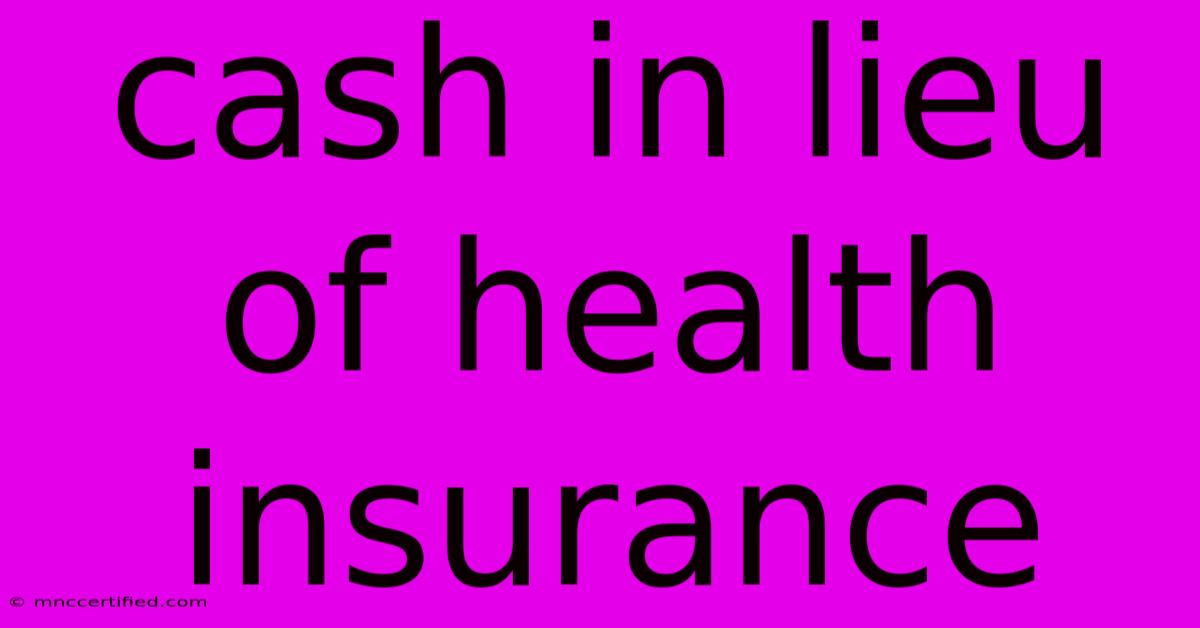Cash In Lieu Of Health Insurance

Table of Contents
Cash in Lieu of Health Insurance: A Comprehensive Guide for Employers and Employees
Choosing between offering health insurance and providing cash in lieu is a significant decision with legal and financial implications for both employers and employees. This comprehensive guide explores the nuances of this option, examining its benefits and drawbacks for each party involved. We'll delve into legal considerations, tax implications, and best practices to ensure a fair and transparent process.
What is Cash in Lieu of Health Insurance?
Cash in lieu of health insurance refers to a situation where an employer offers employees a sum of money instead of providing a traditional employer-sponsored health insurance plan. This cash payment is intended to allow employees to independently purchase their own health insurance or use the funds for other needs. It's crucial to understand that this isn't a universally accepted practice and is subject to various legal and regulatory constraints.
Key Differences from Traditional Health Insurance:
- Employee Choice & Responsibility: Employees have complete control over how they utilize the funds, offering flexibility. However, they also bear the full responsibility for selecting and managing their healthcare coverage.
- Cost Control: Employers might see this as a way to control healthcare costs, especially for smaller businesses.
- Tax Implications: Both employer and employee face specific tax implications, which we'll detail below.
- Compliance: Strict compliance with relevant laws and regulations is paramount to avoid legal issues.
Legal and Regulatory Considerations:
The legality and implications of offering cash in lieu of health insurance vary significantly depending on the country and sometimes even the state or province. In many jurisdictions, employers are not required to provide health insurance. However, offering cash in lieu might still trigger legal scrutiny if it's viewed as a discriminatory practice or if it doesn't comply with specific regulations.
Crucial Considerations:
- Affordable Care Act (ACA) Compliance (USA): In the United States, the Affordable Care Act (ACA) mandates certain employer responsibilities regarding health insurance. Offering cash in lieu may not exempt employers from ACA requirements, particularly regarding employer shared responsibility payments if the employee subsequently obtains a subsidized plan through the marketplace. Consult with a legal professional and tax advisor specializing in ACA compliance.
- Equal Opportunity Employment Laws: Ensure that the cash in lieu program does not disproportionately disadvantage certain employee groups, leading to potential discrimination claims.
- Contractual Obligations: Clearly define the terms and conditions of the cash in lieu arrangement in employment contracts to avoid future disputes.
Tax Implications for Employers and Employees:
The tax implications of cash in lieu are complex and vary based on location and individual circumstances. Always seek professional advice from a tax advisor.
Employer Tax Implications:
- Generally, the cash payment is considered taxable income for the employee and may be deductible as a business expense for the employer (depending on jurisdiction). However, specific rules and regulations might apply.
Employee Tax Implications:
- The cash payment received is typically considered taxable income and subject to income tax withholding. The employee is responsible for paying income taxes on this amount.
Best Practices for Implementing a Cash in Lieu Program:
- Transparency and Communication: Clearly communicate the terms and conditions of the program to all employees, ensuring they understand the implications and their responsibilities.
- Fair and Equitable Distribution: Develop a consistent and equitable system for determining the cash amount offered, avoiding discriminatory practices.
- Legal Counsel: Seek legal advice from an employment lawyer specializing in benefits and compensation to ensure full compliance with all applicable laws and regulations.
- Financial Planning Support: Offer resources to help employees understand their options for purchasing health insurance or managing their finances effectively. This demonstrates good faith and employer responsibility.
- Regular Review and Updates: Periodically review and update the program to reflect changes in regulations, market conditions, and employee feedback.
Conclusion:
Offering cash in lieu of health insurance can be a viable option for some employers and employees. However, it’s vital to navigate the legal, regulatory, and tax implications carefully. Prioritizing transparency, fairness, and professional advice throughout the implementation process is crucial to ensure compliance and prevent potential disputes. Remember, this is a complex area, and seeking expert advice is strongly recommended. This information is for general guidance only and should not be considered legal or financial advice.

Thank you for visiting our website wich cover about Cash In Lieu Of Health Insurance. We hope the information provided has been useful to you. Feel free to contact us if you have any questions or need further assistance. See you next time and dont miss to bookmark.
Featured Posts
-
Historic Auto Insurance Maryland
Nov 21, 2024
-
Russia Ukraine War Live Updates
Nov 21, 2024
-
Aci Therapy Covered By Insurance
Nov 21, 2024
-
Sustainability Penns Action Plan Focus
Nov 21, 2024
-
Cavs At Celtics Game Preview And Info
Nov 21, 2024